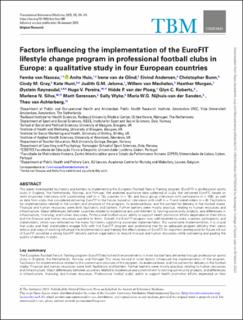Factors influencing the implementation of the EuroFIT lifestyle change program in professional football clubs in Europe: a qualitative study in four European countries
van Nassau, Femke; Huis, Anita; van de Glind, Irene; Andersen, Eivind; Bunn, Christopher; Gray, Cindy M.; Hunt, Kate; Jelsma, Judith G.M.; van Mechelen, Willem; Morgan, Heather; Røynesdal, Øystein; Pereira, Hugo V.; van der Ploeg, Hidde P.; Roberts, Glyn; Silva, Marlene N.; Sørensen, Marit; Wyke, Sally; Nijhuis-van der Sanden, Maria W.G.; Van Achterberg, Theo
Peer reviewed, Journal article
Published version
Permanent lenke
https://hdl.handle.net/11250/3057715Utgivelsesdato
2023Metadata
Vis full innførselSamlinger
- Publikasjoner fra CRIStin [111]
- Tidsskriftartikler [94]
Sammendrag
This paper investigated facilitators and barriers to implementing the European Football Fans in Training program (EuroFIT) in professional sports clubs in England, the Netherlands, Norway, and Portugal. We analyzed qualitative data collected at clubs that delivered EuroFIT, based on semi-structured interviews with coordinating staff (n = 15), coaches (n = 16), and focus group interviews with participants (n = 108), as well as data from clubs that considered delivering EuroFIT in the future, based on interviews with staff (n = 7) and stakeholders (n = 8). Facilitators for implementation related to the content and structure of the program, its evidence-base, and the context for delivery in the football stadia. Financial and human resources were both facilitators and barriers. Further barriers were mostly practical, relating to human resources and infrastructure. Major differences between countries related to experience and commitment to running community projects, and differences in infrastructure, financing, and human resources. Professional football clubs’ ability to support health promotion efforts depended on their ethos and the financial and human resources available to them. Overall, the EuroFIT program was well received by clubs, coaches, participants, and stakeholders, which was reflected by the many facilitators supporting sustained implementation. For sustainable implementation, it is crucial that clubs and their stakeholders engage fully with the EuroFIT program and understand that for an adequate program delivery their views (ethos) and ways of working influence the implementation and thereby the effectiveness of EuroFIT. An important prerequisite for future roll out of EuroFIT would be a strong EuroFIT delivery partner organization to ensure financial and human resources while overseeing and guiding the quality of delivery in clubs. Factors influencing the implementation of the EuroFIT lifestyle change program in professional football clubs in Europe: a qualitative study in four European countries

